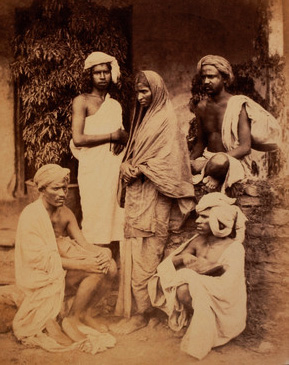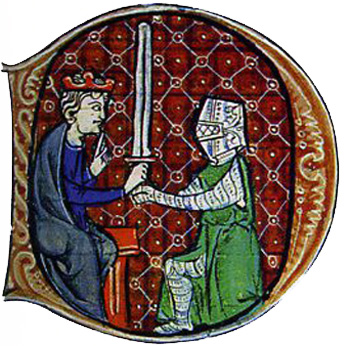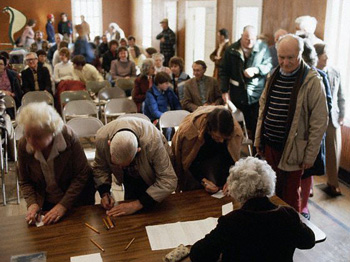 |
Organic Society
The
Social Classes - I
Differentiations & Participation in Society
Plinio Corrêa de Oliveira
Every society has certain categories and professions. Even in the most egalitarian society, such as the one in Russia, which, theoretically speaking should be the most egalitarian since it is communist, we note specializations in it. There we find merchants, industrial managers, intellectual and manual workers. We also find the false priests of the Russian Schismatic Church, which is completely controlled by the Russian communist government.
To have specializations, it is necessary to have men holding different positions, both higher and lower. Thus, at each level we find men with different functions to perform. To pretend that all the professions are equal actually establishes an advantage that favors the lesser professions. In fact, this is what happens in the Russian proletariat dictatorship, where only the proletarians or manual workers have the right to govern, rather than those who exercise functions higher than the proletarians.
Now, if this is true in the egalitarian societies, it applies more so in societies such as ours, which are not completely egalitarian and still have some hierarchy. We still have different social classes: the bourgeoisie or class above the manual workers, and then the military class, the juridical class, the intellectual class and the clergy.
These questions then arise:
- Which one of these different groups, theoretically speaking, has the greater right to be preponderant in the organization of society?
- In the Middle Ages how was this distribution of functions made in society?
How Paganism resolved the differentiation of functions
In India the caste system prevailed. According to it, the person belonged to a determined caste just by the fact of being born into it. There was no possibility of changing from one caste to another.

A group of untouchables doomed to a life of exclusion in the Indian
caste system |
The Hindus understood castes in a religious way. They believed that after death the soul would incarnate into other bodies. If a person had practiced virtue, his soul would incarnate into a superior cast; if he had been bad, he would incarnate into a lower class. Thus, the social class of a person was already determined before his birth.
Now, if the social class is determined by a previous life, then it is not possible in this life for anyone to change his place in society. So, in India the person was completely locked into the social class to which he belonged, without the possibility of rising or falling. The social classes were hereditary and permanently set.
A similar system also prevailed in ancient Egypt. It was organized in such a way that one-third of the land belonged to the priestly class, one-third to the military class and the final third to the Pharaoh.
The priestly and the military classes were fixed absolutely. A priest could never be a military man; he must always be a priest. His sons were also priests forever. The same held true for a military man: Every son of a military man must follow his father’s profession and no one from another class could enter it. These were the two locked classes; under them was the mass of the population, who were the plebeians of Egypt.
How the Catholic Church resolved the differentiation
In Medieval Civilization the Catholic Church recognized three basic classes: the clergy, the nobility and the people. While maintaining the differences, she fundamentally changed some aspects of them.
The first class of society was the clergy. It was a class completely open to all persons who had a vocation to enter it. The Church never demanded that a person belong to a certain social class to become a member of the clergy. On the contrary, it became frequent to see persons from the more modest layers of society ascending to the highest positions in the ecclesiastical hierarchy.

Heroic deeds made soldiers ascend to nobility |
The second class was the nobility. The nobility was a hereditary class, but here also there were remarkable differences compared to the pagan systems. One of the most important differences: A noble could lose his class status if he were to carry out an infamous act. It was also noteworthy that a plebeian could ascend to the nobility if he performed a significant public act.
Thus, the noble class was not a locked situation wherein it was impossible for anyone to enter or leave. It had a certain flexibility that allowed a slow renovation. Little by little those who were deficient or depraved would be eliminated and people with a new blood would enter because of their virtues and abilities. It was a class that had a great stability, but it was an open class.
The third class was constituted by the bourgeoisie and the plebeians with a multitude of differentiations – both between these two layers and inside each level of the people’s hierarchy.
The question we want to examine in this series is this: To what degree should and did all these people – the clergy, nobility, landowners, scholars, industrial workers, merchants, peasants and manual workers – effectively participate in the direction of the State?
Participation in the public power based on numbers
The modern political organizations have generally resolved the problem of participation in the public power based on numbers. The State takes an indifferent position regarding social classes, affirming that everyone is equal and has the same right to one vote. When it is time to vote, the result is obtained numerically. The choice is made by a majority vote.

Everyone with an equal vote at a town meeting in Maine |
In appearance it is a very good solution since the direction of the State should be in the hands of those who are more interested, and the majority should be more interested than any small group in the direction of the public affairs.
However, when we consider the question of competence and specialization, deficiencies appear. Indeed, often the majority of men are not the most intelligent, with more criteria to judge and conditions to orient. Such persons normally constitute a minority in society. Thus, the error in this system is that it establishes that everything be resolved simply by the weight of numbers, which excludes the elites and destines them to be always defeated by the majority.
This simple mechanism of the majority vote ends by turning things upside-down: that is, the authentic leaders who truly have conditions to orient the majority are excluded. Instead, those who are able to manipulate this system behind the scenes rise as an artificial elite that controls the majority vote.
For this reason, Pope Pius XII directed the attention of statesmen and men of culture to the following problem: to know how participation in the direction of a State should be distributed inside a country so that it can be wisely oriented and governed.
To accomplish this task, we will study how this happened in the Middle Ages in order to see whether a suggestion for a solution in our times can be found.
Continued

Posted April 22, 2013

  | | Prof. Plinio |
Organic Society was a theme dear to the late Prof. Plinio Corrêa de Oliveira. He addressed this topic on countless occasions during his life - at times in lectures for the formation of his disciples, at times in meetings with friends who gathered to study the social aspects and history of Christendom, at times just in passing.
Atila S. Guimarães selected excerpts of these lectures and conversations from the transcripts of tapes and his own personal notes. He translated and adapted them into articles for the TIA website. In these texts fidelity to the original ideas and words is kept as much as possible.

Related Topics of Interest
 The Three Orders of Medieval Society The Three Orders of Medieval Society
 A Participative Society A Participative Society
 How Intermediary Societies Participate in the State Power How Intermediary Societies Participate in the State Power
 The Perfect Societies: Church & State The Perfect Societies: Church & State
 The Organic Formation of a Region The Organic Formation of a Region
 All Classes Should Have Elites All Classes Should Have Elites
 Fostering the Originality of Each Social Cell Fostering the Originality of Each Social Cell
 The Bourgeois in Free Cities and Kingdoms The Bourgeois in Free Cities and Kingdoms
|
Organic Society | Social-Political | Home | Books | CDs | Search | Contact Us | Donate
 © 2002-
Tradition in Action, Inc. All Rights Reserved
© 2002-
Tradition in Action, Inc. All Rights Reserved
|
 |
|